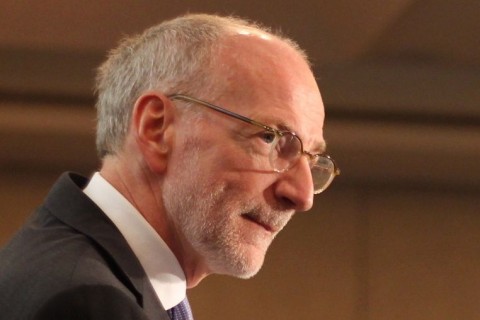
TORONTO – The public broadcaster’s ongoing transformation in the way it serves Canadians hasn’t been easy, but “the need for a Canadian public space” is more important than ever, according to CBC/Radio-Canada president and CEO Hubert Lacroix.
In an address to the Economic Club of Canada in Toronto on Thursday, Lacroix talked up the Corp’s recent successes as a result of its strategic plan 2020: A Space For Us All, including the 15 million Canadians that use its digital sites for news and information, a number that has increased by 3 million in the last year, and its new podcast series Someone Knows Something that became the top downloaded podcast on iTunes in Canada the first day it was available, and one of the top podcasts downloaded in the U.S. within weeks.
“Let me tell you about one example that I am particularly proud of: The Missing and Murdered Indigenous Women project, created, in Winnipeg, by our Aboriginal Digital Unit together with our investigative I-Team”, he said. “They used the power of digital to make personal what, for many Canadians, had been only a distant issue. Over six months, they met with each woman’s families and friends. They looked at every single case. They created an interactive site with the space to really tell each of their stories; the first of its kind. It’s incredibly powerful. And it’s producing results. It got Canadians talking about what’s been happening in their backyard. Because of their work, the RCMP reopened two cold cases and were able to successfully close another. And they’ve inspired others who are now creating, and sharing, incredible digital projects across CBC/Radio-Canada.”
But change and constant movement can be difficult, especially on employees, he added, which has resulted in an internal shift to share “weekly wins” in addition to larger successes, so that “everyone can see, and share that feeling that their effort is worth it; that transformation is allowing us to do things we couldn’t do before.”
“More than 1,260 of our employees have retrained for new digital skills, training that is key to our digital successes”, Lacroix continued. “Another 630 have trained for new business skills to support this new direction at all levels. We are also hiring the next generation of digital creators: 150 new positions have been filled and we look to hire about 300 more in the coming years, again to support our Plan.”
Lacroix also elaborated on how CBC/Radio-Canada will use some of its new funds from the recent federal budget.
“Here are a few details that we shared last week with our staff.
– We are going to reduce repeats on our radio networks.
– We are going to support risk-taking projects and lab-type initiatives that will create new storytelling.
– We have had tremendous success using nimble pocket bureaus to improve our international coverage from Moscow and Rio. We’re going to add more, starting with Turkey, ground zero in the human migration story.
– We’re going to reinvest in in regions that were cut too deeply. In 2012, we had to put on hold plans to open a radio and digital station to serve people in London, Ontario. I’m happy to say that project is now back on track.
– We are going to digitize more of our rich archives, with a priority on our indigenous archives. They hold the stories and experiences of Canadians. We want Canadians to be able to access them.
– We’re also going to celebrate high profile events like next year’s 150th anniversary of Confederation, and this summer’s Olympics.”
Lacroix said that a decline in advertising “continues to undermine the ability of all broadcasters to create good Canadian programs”, but added that the federal government’s upcoming culture review “is a very important step in addressing this challenge.”
“We have heard the Minister of Canadian Heritage say that Canada's cultural and creative industries are a vibrant part of our economy and national identity”, he concluded. “And when government says that culture is important, something else happens. People start to think about what is possible again. I notice it when I speak with my colleagues at Telefilm or the National Film Board. We are optimistic about the future and eager to work on new ideas; we are now back at envisioning partnerships and projects to support Canadian culture. It's an exciting time.”
– Lesley Hunter
Photo by Steve Faguy


